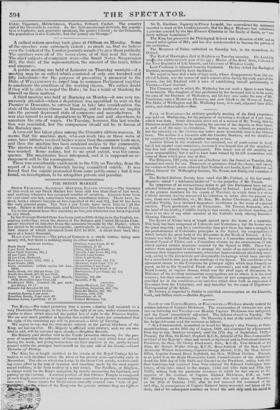A radical reform meeting took place at Oldham on Monday.
Some of the speeches were extremely violent ; so much so, that we believe even the boldest of the London journals scrupled to give them publicity. The speakers were all of the lower class, or of that next the lower. The chief subjects of complaint were—the Small Notes Suppression Bill, the state of the representation, the amount of the taxes, tithes and sinecures.
A public meeting was held at Leicester on Thursday sennight—if a meeting may be so called which consisted of only one hundred and fifty individuals—for the purpose of presenting a memorial to the Duke of WELLINGTON to impel him to summon Parliament together to ameliorate the condition of the working classes. We rather doubt if they will be able to impel the Duke ; lie has a habit of thinking for himself on these matters.
A third meeting was held at Barnsley on Monday—it was very nu- merously attended—when a deputation was appointed to wait on the Premier at Doncaster, to entreat him to take into consideration the state of the labouring classes in Barnsley, and to institute an inquiry into the present depressed state of commerce and manufactures. It was also agreed to send deputations to Wigan and and elsewhere, to ascertain the rate of wages. On Tuesday, however, this last resolu- tion was rescinded, lest the comparison should not be in favour of the Barnsley men. A turn-out has taken place among the Coventry ribbon-weavers. It seems that the machine men, who can work two or three webs at once, have hitherto received higher wages than the common loom men, and thus the machine has been rendered useless to the community. The masters wished to place all weavers on the same footing; which was resisted. Some rioting, but to no great extent, was the conse- quence. The magistrates have interposed, and it is supposed an ar- rangement will be the consequence. There was considerable excitement in the City on Tuesday, from the report of a banker in Norwich having committed suicide. It was feared that the suicide proceeded from some public cause ; but it was found, on investigation, to be altogether private and peculiar.


















 Previous page
Previous page